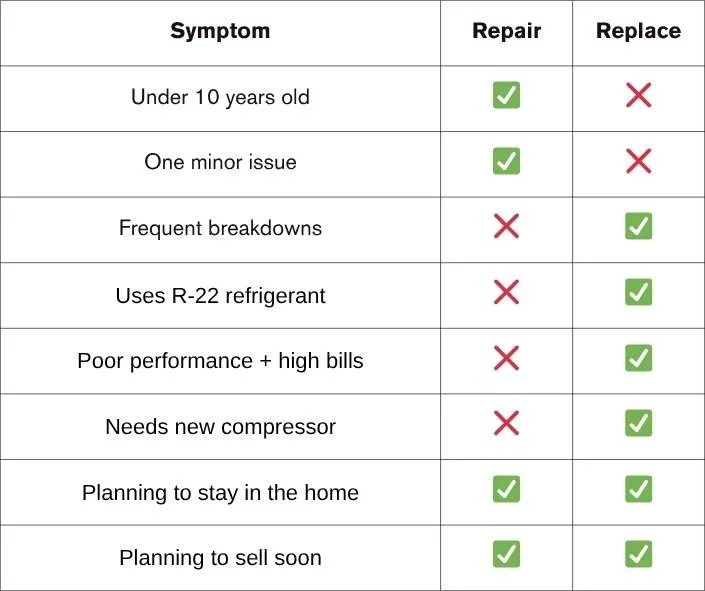Time for a Change? When to Replace Your AC System
No one looks forward to replacing their air conditioning system—but when the time comes, it’s unavoidable. The last thing you want is to be stuck in the summer heat because you ignored the warning signs. Whether it’s lackluster comfort or an energy bill that keeps climbing, knowing when it’s time to upgrade can save you money, stress, and plenty of sweat.
Signs It’s Time to Retire Your AC System
1) Your System is 10-15+ Years Old
Age alone isn’t a guarantee of failure, but it’s an important factor. Most AC systems last 10–15 years, with a lucky few reaching 20 if they’re well-maintained. Past the 10-year mark, wear and tear start to add up—especially in areas with harsh weather or salty air.
Even if your older system is still running, it’s worth weighing the cost of major repairs against the benefits of a new, energy-efficient unit. In many cases, replacement becomes the more cost-effective option.
2) Frequent Repairs
If your HVAC technician feels like family because they’re always at your house, it’s a red flag. Occasional small repairs are normal, but breakdowns every season—or multiple major part replacements in recent years—signal a system in decline.
Ask yourself:
· Was the last repair more than 25–30% of the cost of a new system?
· Have you had multiple major parts replaced recently?
· Are repairs becoming more frequent?
If the answer is yes to any of these, it’s probably time to invest in a replacement instead of pouring money into a failing unit.
3) Rising Energy Bills
Older systems lose efficiency over time. If your energy bills are cooling system may be the culprit.
Catching this early gives you time to plan for an upgrade to a high-efficiency system that will lower your utility costs long term.
4) Inconsistent Cooling
Your AC system shouldn’t struggle to keep your home cool. If the thermostat says one thing but your comfort tells you another, there’s a problem. While some issues can be fixed (like refrigerant levels), an aging unit that consistently underperforms is often best replaced.
5) Strange Sounds or Smells
Unusual sounds or smells are warning signs you shouldn’t ignore:
· Grinding, squealing, or banging noises
· Musty, burning, or chemical odors
· Odd vibrations when the system starts or stops
These could point to serious issues such as motor failure, mold growth, or electrical problems. If your system is older and showing multiple red flags, replacing it may be more cost-effective than repairing.
6) Outdated Refrigerant
If your AC still uses Freon (R-22), replacement should be a priority. This refrigerant has been phased out and is expensive to source. Even a simple leak can turn into a costly repair. Upgrading to a system with modern, eco-friendly refrigerant will save money and reduce environmental impact.
7) Changes in Your Home
If you have renovated, added square footage, or finished a basement, your existing AC may no longer be properly sized. An undersized system will short-cycle, work harder, and drive up energy bills.
Depending on your situation, a replacement system may be the best fit. But if it feels premature, you might consider options like ductless mini-splits, which are energy-efficient and great for targeted comfort.
If you’re preparing to sell your home, upgrading your AC can also be a smart move—buyers value efficiency and comfort.
Replace or Repair? The Bottom Line
We have created a simple chart to help guide you before calling your HVAC technician. It highlights the key points from this blog so you can better evaluate your system and ask the right questions.
If you have any questions or concerns, feel free to contact us.
Whether you need 24/7 emergency service or a solution to improve your indoor comfort—at home and work—call us at 781-224-2400 or submit a convenient contact form.



